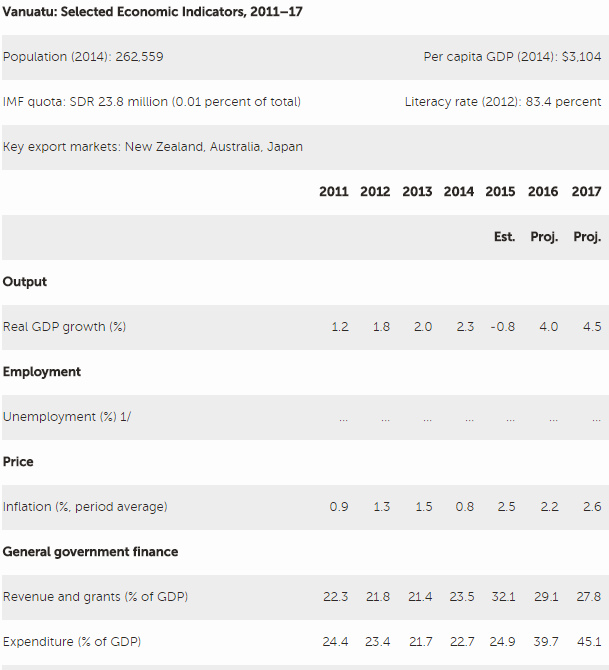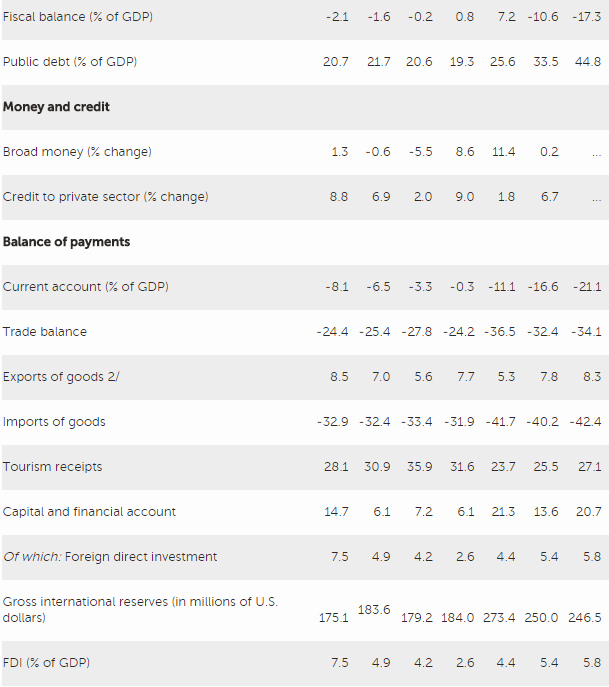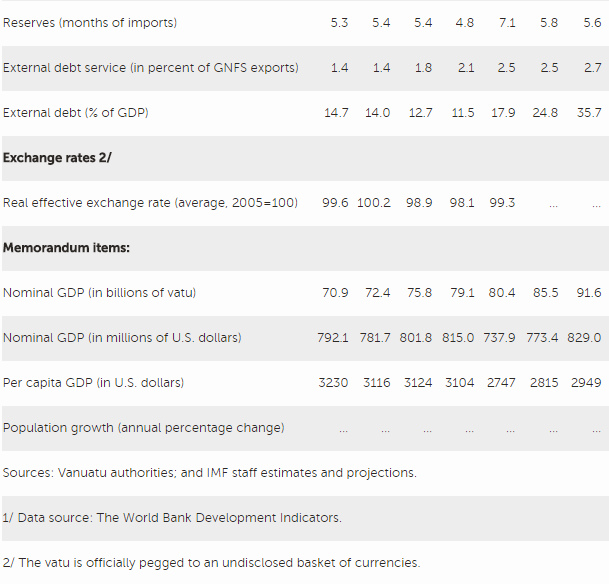IMF Executive Board Concludes 2016 Article IV Consultation with Vanuatu
On October 21, the Executive Board of the International Monetary Fund (IMF) concluded the 2016 Article IV consultation with Vanuatu.
Vanuatu’s economy is gradually recovering from the extensive damages caused by Cyclone Pam, which hit the country in March 2015, and reconstruction efforts have started to yield positive results. In June 2015, the IMF Board approved a disbursement of about USD23.8 million under the Rapid Credit Facility and the Rapid Financing Instrument. The IMF’s financial assistance helped Vanuatu cope with its immediate balance of payments needs and played a key role in catalyzing critical donor support for the recovery.
The cyclone led to a decline in GDP of about 0.8 percent in 2015, relative to pre-cyclone projections of 3.5 percent. Reconstruction activity and infrastructure investment pushed inflation up to 2.5 percent in 2015 from about 1 percent in 2014. The current account deficit widened to 11 percent of GDP in 2015 from an average of 3 percent of GDP in the previous three years with sharply increased imports and depressed exports due to severe damages to tourism facilities and agricultural production.
Near-term prospects are favorable but risks to the outlook are tilted to the downside. Real GDP growth is expected to reach 4 percent in 2016 and 4.5 percent in 2017 driven by the recovery in tourism and agriculture, and further ramping-up of infrastructure projects. The risks to this favorable outlook stem mainly from the uncertainty in the rate of implementation of the public infrastructure projects. The danger of natural disasters is ever-present, aggravated by the cyclical effects of El Niño’s droughts and La Niña’s heavy rainfall.
In 2016 government spending is projected to increase by 16 percent of GDP, including unspent cyclone-related grants received in 2015, resulting in a fiscal deficit of about 10 percent of GDP. Major infrastructure projects have recently started or are in the pipeline under an ambitious infrastructure investment program. These will be partly financed through external borrowing, raising central government debt sharply to 33.5 percent of GDP in 2016 and higher over the medium term. The government aims to cover the resulting fiscal gap with additional grant financing, in particular earmarked for public infrastructure projects.
The current account deficit is projected to widen further to around 20 percent of GDP in 2016 due to cyclone-related spending and the high import content of the major infrastructure projects. This deficit is envisaged to be financed by donor grants and loans, and foreign direct investment. Foreign reserves stood at USD 273 million (7.1 months of imports) by end-2015 bolstered by cyclone-related grants and loans from international partners.
The monetary policy stance has been accommodative in an effort to support growth in the aftermath of Cyclone Pam and the peg to a basket of currencies has served Vanuatu well in promoting stability and confidence. Inflation is projected to remain below 3 percent in the medium term owing to low commodity prices, even though expanding domestic demand will provide some upward pressure. Banks have fully recovered from the cyclone and are adequately capitalized and liquid. The financial system is sound, but further progress on financial inclusion is needed especially in the outer islands.
Executive Board Assessment
Executive Directors noted that Vanuatu’s economy is gradually recovering from the extensive damages caused by Cyclone Pam, and commended the authorities for their effective response and reconstruction efforts, which are yielding positive results. Directors noted that growth is expected to rebound in 2016 owing to the recovery of tourism and agriculture, and the scaling up of public investment. They concurred, however, that risks are mostly tilted to the downside given uncertainty in the rate of implementation of public infrastructure projects and the country’s vulnerability to natural disasters.
Directors agreed that the immediate response to Cyclone Pam has been effective in alleviating human suffering and restoring economic activity. They emphasized, however, the importance of improving the country’s resilience to natural disasters by building domestic and external buffers, promoting resilient infrastructure, and establishing more effective contingency plans.
Directors noted that major infrastructure projects, which have recently started or are in the pipeline, may challenge debt and fiscal sustainability. They stressed that a careful selection of investment projects, revenue mobilization, and fiscal discipline are essential to reduce the pressure on fiscal accounts. Directors commended the authorities for launching a comprehensive tax reform initiative, including the introduction of a corporate and personal income tax. They agreed that additional financing should continue to be sought on grant and concessional terms.
Directors agreed that the financial sector has been recovering well from the adverse impacts of Cyclone Pam, and that the Reserve Bank of Vanuatu must take action to secure financial and price stability by gradually normalizing regulatory requirements for banks and non-banking financial institutions. They welcomed the authorities’ recent initiatives to address shortcomings regarding anti-money laundering and combating the financing of terrorism (AML/CFT) and emphasized the need to accelerate the implementation of the AML/CFT action plan, including by drawing on technical assistance from international partners.
Directors viewed the accommodative monetary stance and the continuation of the exchange rate peg as appropriate in supporting economic recovery after the cyclone, while ensuring price and financial stability. They noted that, considering the weak transmission mechanism, vigilance is needed to check inflation pressures, and ensure monetary policy remains consistent with the exchange rate peg and reserve cover goals. Directors encouraged the authorities to enhance the effectiveness of monetary policy by streamlining policy objectives and instruments and by deepening financial markets.
Directors noted that a concerted effort to promote private sector investment by further implementing land reforms and enhancing quality upgrading in the tourism and agricultural sectors are key to ensure poverty is reduced and prosperity shared. They stressed that improving access to employment opportunities and financial inclusion should remain a priority to strengthen households’ resilience to external shocks, especially in the outer islands.



Source: International Monetary Fund
- 409 reads
Human Rights
Fostering a More Humane World: The 28th Eurasian Economic Summi

Conscience, Hope, and Action: Keys to Global Peace and Sustainability

Ringing FOWPAL’s Peace Bell for the World:Nobel Peace Prize Laureates’ Visions and Actions

Protecting the World’s Cultural Diversity for a Sustainable Future

Puppet Show I International Friendship Day 2020

